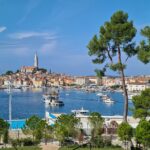ZAGREB, January 23, 2019 – Croatian Prime Minister Andrej Plenković said on Tuesday that his government is ready to increase funding for specific projects that are important for the position of Croats in Serbia, a government press release said.
Plenković met in Zagreb with the head of the Democratic Alliance of Croats in Vojvodina (DSHV) and member of the Serbian parliament, Tomislav Žigmanov, and the newly-elected president of the Croatian National Council in Serbia, Jasna Vojnić.
Plenković “expressed the readiness of the Croatian government to increase allocations in the coming period for specific projects that are important for the position of the 58,000-strong Croatian community in Serbia and for the protection of Croatian cultural identity,” the press release said.
Žigmanov and Vojnić spoke of the dialogue they had begun at the start of last year with senior Serbian officials. They cited the importance of achieving better opportunities for education in the Croatian language and Latin alphabet and the appropriate representation of the Croatian minority in the National Assembly and regional and local legislatures. They also called for including the Croatian community in EU-funded cross-border projects, the press release said.
Žigmanov, said during a visit to Zagreb on Tuesday that the Croats in Serbia were “a wounded community” and needed Croatia’s assistance in achieving their priorities. “The Croatian community in Serbia is poorly developed institutionally. We are a wounded community, a community that has the lowest GDP in Europe. We are the poorest Croats in the world, we live in a very unfavourable social environment where over 50 percent of people have a highly negative opinion of Croats, where tensions between the two countries reached the highest-level last year,” Žigmanov told a press conference after meeting with President Kolinda Grabar-Kitarović.
He said that the Croatian community was considerably less developed than other minorities in Serbia and had much less money at its disposal. This makes the position of the Croats in Serbia more complex and diminishes their prospects, he added. “We expect to see how Croatia can help us with our priorities,” Žigmanov said, noting that the Croatian community in Serbia still could not achieve certain things without the Croatian government’s help.
Thanking the Croatian government for what it had done so far, Žigmanov said that the Croats in Serbia had “a vision and the energy” to carry through development projects, but needed assistance.
Speaking of the Croatian minority’s basic political demand to have guaranteed representation in the Serbian parliament, Žigmanov said that this was the most complex issue and that it was still far from resolution. “We will see if and when it will be achieved, but we are not giving up on it.”
Asked what would happen in Serbia if Croatian children did not stand up for the Serbian national anthem, as had been the case in Vukovar when Serb children remained seated at a sporting event during the playing of the Croatian anthem, Žigmanov would not speculate about it, saying he wanted to help relax Croatian-Serbian relations. “Such comparisons are very difficult to make. What is important is that we do not manifest such deficits of loyalty and have not had such experiences,” he said.
“We, of course, are not happy when ethnically-motivated incidents happen, but what we have seen to exist as a practice in Croatia and not in Serbia is that there are condemnations and appropriate penalties and that attention is drawn to unlawful acts,” Žigmanov said, noting that the situation in Croatia was generally much better than in Serbia.
“A convicted war criminal, Vojislav Šeselj, has threatened to commit a war crime against me, and none of the government officials has reacted to that, nor have any steps been taken by prosecutors or any other institution,” he said.
Žigmanov said that the citizens of Croatia could be satisfied with the situation in their country, which he described as institutionally developed and well-functioning.
More news on the status of Croats in Serbia can be found in the Politics section.







